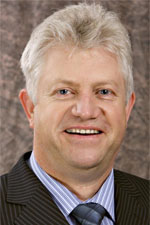
Winde visited the province's two largest abalone farms, Abagold and HIK Abalone Farm, both in Hermanus, on 12 June. Together they produce more than 400 tons of abalone each year. Abalone, known as perlemoen in South Africa, is a sea snail or marine gastropod mollusc. Its meat is widely considered to be a delicacy, and it is eaten either raw or in a variety of dishes, particularly in the Orient. The iridescent shells are used for jewellery and buttons, and the pearls have long been collectors' items.
Aquaculture in Western Cape employs 2 300 people, or 78% of the total number of workers employed in the industry country wide. Research by Stellenbosch University in 2010 determined that the province had 20 abalone farms and they were estimated to have sales of R355-million (US$37-million).
Abagold is one of the largest farms in South Africa and employs 350 people. Earlier this year, it won the exporter award in the South African Premier Awards. HIK has 1 500 tanks and its own processing facility. Winde said aquaculture in the province was expected to show triple-digit growth over the next 10 to 15 years. To maintain the current level of fish consumption worldwide, he pointed out that it was estimated that global aquaculture production would have to grow from 45.5-million tons a year - as recorded in 2004 - to 80-million tons by 2050. These figures are from a study done by the Western Cape department of economic development and tourism.
The provincial government would invest R50-million ($5-million) into the sector in this financial year. Winde said many of the farms were expanding and creating jobs, especially in rural and coastal areas in and around fishing towns. "This is why the Western Cape government, through the Western Cape Aquaculture Development Initiative, supports growth in the industry." The government was also identifying companies for the investment project.
Economic development and tourism, Western Cape Aquaculture Development Initiative and National Department of Agriculture, Forestry and Fisheries wanted to declare the region from Hermanus to Gansbaai an SEZ. The final decision on the zones is taken by the Department of Trade and Industry.
According to the provincial economic development and tourism department, worldwide production from capture fisheries has levelled off and many main fishing areas have reached their maximum potential. Winde said rising electricity costs in the past few years had affected abalone farmers in municipal areas as they could not negotiate special tariffs with power supplier Eskom. "The Western Cape government is investigating whether energy costs could be reduced by way of zoning arrangements such as the declaration of SEZs".
These zones would be entitled to incentives, he added.
In 2010, Western Cape led the aquaculture sector with 20 farms; there are nine in Eastern Cape, three in Northern Cape and one in Kwazulu-Natal. Engineering News reported that South Africa produced less than 1% of Africa's aquaculture production. In 2011, the country produced 7 686 tons of fish products, a far cry from the 900 000 tons produced by Egypt and 200 000 tons by Nigeria.
Palesa Mokomole, the spokeswoman of Agriculture Minister Tina Joemat-Petterson, said that abalone farms had created the majority of direct new jobs in the aquaculture sector, with a total of 1 219 jobs in 2012.
Aquaculture, also known as aqua farming, is the farming of aquatic organisms and is divided into fresh water culture and mariculture. Species farmed in the latter include dusky kob, abalone, Pacific oyster, Mediterranean mussel and black mussel, among others. According to the National Aquaculture Strategic Framework, the sector is relatively small and the government wants to create a climate in which it can grow. Special attention will be paid to freshwater aquaculture as it has shown growth potential.
The government will also push investments in research, development technology, transfer and extension, as well as education and training programmes in aquaculture.
In March, the national government launched the R800-million ($82-million) Agriculture Development Enhancement Programme (ADEP), which offers cost sharing grants of R40-million ($4-million) per company. The aim is to create more jobs in the sector. The grants will be made available for machinery, equipment, infrastructure, commercial vehicles and work boats in pursuit of boosting competition in the industry.
The Department of Trade and Industry says the objective of the ADEP is to stimulate investment by means of increasing production, sustaining and creating jobs, encouraging geographical spread as well as increasing participation of broad-based black economic empowerment companies. The ADEP will run until 31 March 2018 and will be available for fish hatcheries, fish farms and for the production, processing and preserving of aquaculture fish.
According to SouthAfrica.info, the country indefinitely suspended abalone fishing in its waters from February 2008, as marine authorities "take drastic measures to protect the rapidly depleting shellfish species from commercial extinction". It said illegal fishing - poaching - and increased inward migration of West Coast rock lobster that destroys abalone habitat were being blamed for a decline in the shellfish's numbers.
"We are unfortunately at a point where the commercial harvesting of wild abalone can no longer be justified because the stock has declined to such an extent that the resource is threatened with commercial extinction," the government said when it made the announcement in October 2007.
Abalone fishing is severely restricted in South African waters, but poaching is rife as it is a lucrative trade. A main cause for the decline in abalone numbers, SouthAfrica.info pointed out, was the rampant poaching over the years. The species is "highly coveted and fetches high prices, especially in the Far East".
MediaClubSouthAfrica.com is hosted by the International Marketing Council of South Africa (IMC), the custodian of Brand South Africa. The site is a free service for all media professionals - journalists, editors, writers, designers, picture editors and more - as well as for non-profit organisations and private individuals. Its specific focus is on South Africa and Africa.
Go to: http://www.mediaclubsouthafrica.com/